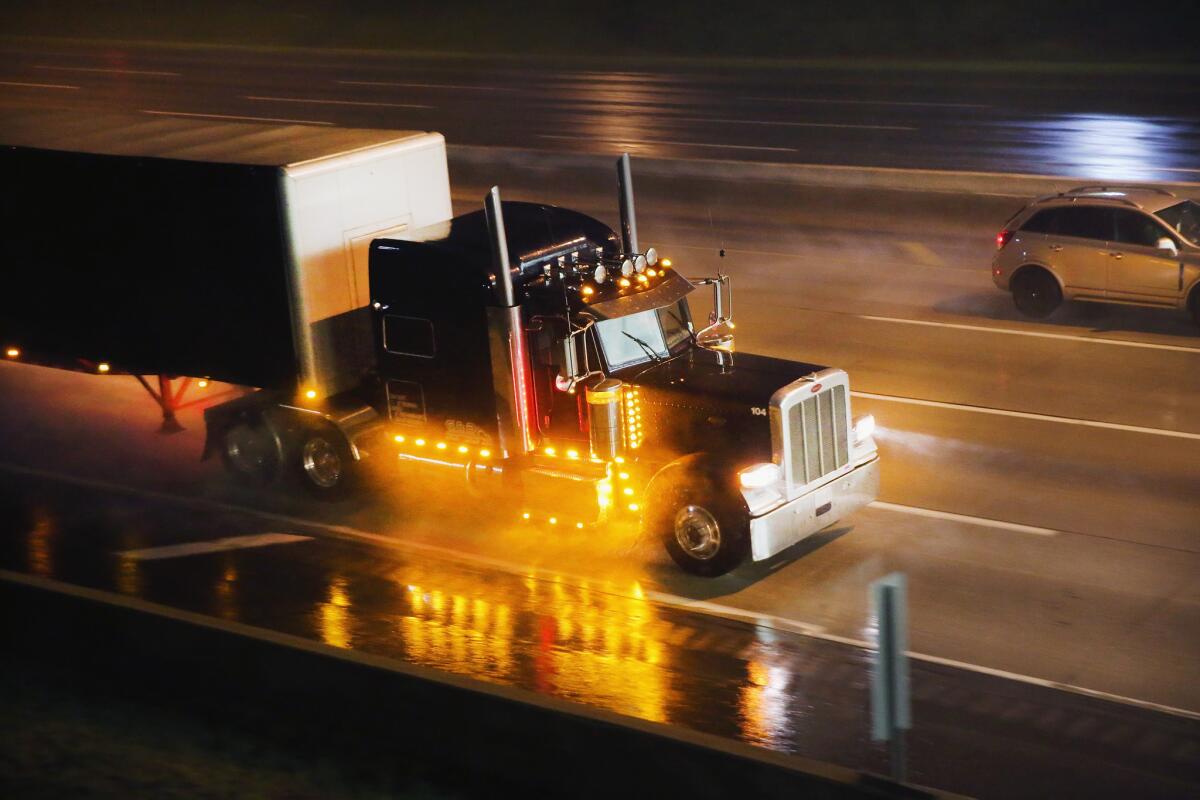Op-Ed: To fight trucker fatigue, focus on economics, not electronics

- Share via
Last month, after a tractor-trailer collided with a vehicle carrying actor Tracy Morgan and others, national attention focused — briefly — on the serious issue of fatigued truck drivers.
The truck’s driver, Kevin Roper, was charged with vehicular manslaughter in the death of comedian James McNair, one of the vehicle’s passengers, and prosecutors alleged Roper hadn’t slept in more than 24 hours. But then an initial report from the National Transportation Safety Board said that Roper had been working for 13 1/2 hours at the time of the crash, just within the legal limit of 14 hours on duty with no more than 11 hours behind the wheel.
Let’s hope the discussion doesn’t stop there. The nation’s trucking system needs to be reformed, and the changes must address root economic causes underlying a range of unsafe practices.
I’ve spent the last three years researching truckers’ compliance with federal regulations limiting the hours they can work. I’ve spoken with hundreds of truckers and other industry stakeholders to try to figure out what drives truckers to work past the point of fatigue, and what can be done about it.
Truckers don’t work without sleep for dangerously long stretches (as many acknowledge having done) because it’s fun. They do it because they have to earn a living. The market demands a pace of work that many drivers say is impossible to meet if they’re “driving legal.”
In the face of rising consumer demand for overnight shipments and for fresh produce trucked from the opposite coast, shippers have upped the pressure both to move goods quickly and to keep costs low. Since many truckers are paid by the mile, they’re incentivized to stay on the road as much as possible. (As truckers are fond of saying, “If the wheel ain’t turnin’, you ain’t earnin’!”)
One thing that makes this possible is that truck drivers are explicitly exempted from the Fair Labor Standards Act, so they aren’t legally entitled to overtime pay or other protections designed to prevent their labor from being exploited.
Trucking firms today operate on razor-thin margins in a highly competitive industry, and many of them, according to the truckers I’ve interviewed, put tremendous pressure on their employees to break the law by staying on the road too long. Federal safety rules are frequently ignored in service of on-time delivery to the customer.
Independent drivers, who own and operate their trucks, feel the pressure too. They often use brokers to land jobs, and they say they lose out on opportunities for work if they hew too closely to the rules. A customer doesn’t want to wait around while a trucker takes a nap, even if it is legally required. And, the drivers say, there’s always someone else willing to break the rules if it means getting a good haul.
In an attempt to increase truckers’ compliance with the hours-of-service rules, the Federal Motor Carrier Safety Administration — the federal agency in charge of regulating the trucking industry — is very likely to soon mandate that all truckers install electronic logging devices. Electronic monitors create less “fudge-able” records of truckers’ driving time, as compared with the easily falsified paper logs — which truckers sometimes call their “comic books” — that have been used for decades.
These electronic systems will help guard against some unsafe practices, but they won’t address many of the biggest sources of trucker fatigue. Truckers will tell you that long stretches of “detention time” — the (typically unpaid) hours that a trucker must wait at a shipper’s terminal to be loaded or unloaded — are what really exhaust them, and force them to be on duty for far more hours than are legally permitted.
Most truckers are also unpaid for the many hours they spend completing mandatory inspections, dealing with repairs, filling out required paperwork, checking the security of their loads and many other important tasks that make up their long workdays. None of these activities will be addressed by electronic logs, and drivers will most likely continue to squeeze them into their required “rest” periods, as they have been doing for decades.
The road is an unpredictable workplace. As anyone who has driven on the highway knows, road travel is fraught with contingencies, from weather to congestion to accidents, all of which can make a trip take longer than anticipated. Add to that the other pressures to keep driving — economic incentive, employer pressure, the dearth of safe places to park and rest, and the desire to get home after days or weeks away — and you begin to get a sense for why truckers drive for as long as they do.
Economist Michael Belzer has compared trucks to “sweatshops on wheels” because of the low rates of pay, long working hours and unsafe conditions. To be sure, we should implement sensible rules that restrict drivers’ work hours to reasonable standards, and electronic monitoring may be a useful tool for doing so.
But electronic monitoring is an incomplete solution to a serious public safety problem. If we want safer highways and fewer accidents, we must also attend to the economic realities that drive truckers to push their limits.
Karen Levy is a doctoral candidate in sociology at Princeton University and a fellow at the Data & Society Research Institute.
Follow the Opinion section on Twitter @latimesopinion
More to Read
A cure for the common opinion
Get thought-provoking perspectives with our weekly newsletter.
You may occasionally receive promotional content from the Los Angeles Times.










